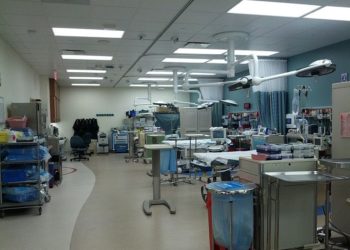Comparison of resuscitative endovascular balloon occlusion of the aorta versus resuscitative thoracotomy for aortic occlusion
1. This multicentre, comparative effectiveness study demonstrated that aortic occlusion via resuscitative endovascular balloon occlusion of the aorta (REBOA) zone 1 was significantly associated with reduced mortality compared to aortic occlusion via resuscitative thoracotomy.
2. Future research through randomized controlled trials is warranted to verify whether REBOA zone 1 is an effective and safe alternative therapy for aortic occlusion.
Evidence Rating Level: 2 (Good)
Study Rundown: Aortic occlusion (AO) limits bleeding in the emergency department during severe traumatic hemorrhagic shock. Originally, this was achieved with a resuscitative thoracotomy (RT). However, this treatment was associated with severe patient morbidity and high-risk transfer of blood-borne illness to the healthcare team. A new treatment strategy called resuscitative endovascular balloon occlusion of the aorta (REBOA) zone 1 may be associated with improved patient outcomes. This multicentre (28 trauma centres) comparative effectiveness study using the AORTA registry compared various outcomes between REBOA and RT for patients with severe hemorrhagic shock who underwent AO. The primary outcome was in-hospital survival. Among 991 patients, 306 (30.9%) received REBOA zone 1, and 685 (69.1%) received RT. Propensity-matching analysis was used. In the adjusted analysis, AO via REBOA zone 1 was significantly associated with reduced mortality compared to RT in all models (78.6% vs. 92.9%; log-rank P = 0.02). Among secondary outcomes, therapy with REBOA zone 1 was not significantly associated with additional ventilator-free days or intensive care unit-free days. Multivariate analysis adjusted for statistically significant confounding variables. In this analysis, AO therapy via RT was significantly associated with a greater risk of mortality (adjusted relative risk [aRR]: 1.25 [95% CI: 1.15-1.36]). REBOA zone 1 therapy provided the greatest survival benefit among those who suffered from a traumatic brain injury (aRR: 1.20 [95% CI: 1.01-1.43]). Overall, this study demonstrated that REBOA zone 1 was associated with an improved mortality benefit compared to RT. However, the propensity-score matching excluded a large number of patients to match the two groups, and ultimately, the matched analysis consisted of patients with less severe hemorrhage compared to the true population who requires AO. Therefore, future research is required to better understand the efficacy of REBOA zone 1 for the most severe hemorrhagic shock.
Click to read the study in JAMA Surgery
Click to read an accompanying editorial in JAMA Surgery
Image: PD
©2022 2 Minute Medicine, Inc. All rights reserved. No works may be reproduced without expressed written consent from 2 Minute Medicine, Inc. Inquire about licensing here. No article should be construed as medical advice and is not intended as such by the authors or by 2 Minute Medicine, Inc.





